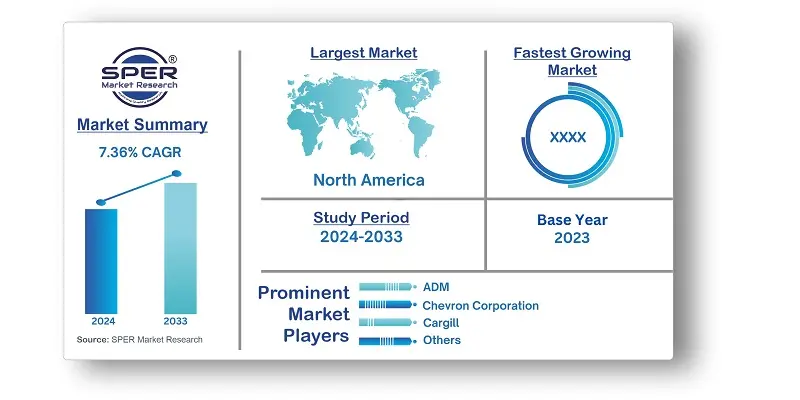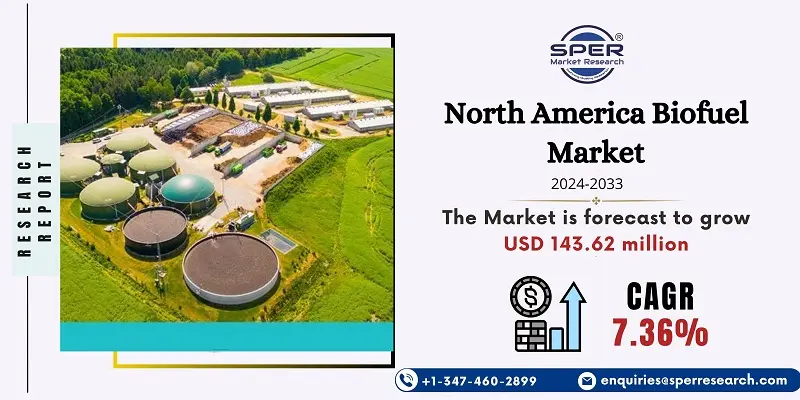
North America Biofuel Market Growth, Size, Trends, Demand, Share, Revenue and Future Outlook
North America Biofuel Market Size- By Fuel Type, By Feedstock, By Application- Regional Outlook, Competitive Strategies and Segment Forecast to 2033
| Published: Apr-2024 | Report ID: POAE2430 | Pages: 1 - 152 | Formats*: |
| Category : Power & Energy | |||
- The U.S. Department of Energy (DOE) announced in January 2023 that funding totaling USD 118 million had been granted to 17 projects with the goal of hastening the nation's production of sustainable biofuels for use in industry and transportation. The DOE wants to reduce greenhouse gas emissions by at least 70% by 2030 and achieve cost-competitive biofuels. This program is in line with that aim.
- The Environmental Protection Agency (EPA) and the U.S. Department of Energy (DOE) announced in February 2024 that they would be providing USD 9.4 million in financing to encourage the development of advanced biofuels. As a component of President Biden's Investing in America Agenda, this program seeks to boost the rural economy, lessen dependency on foreign oil, and promote the manufacturing of cleaner fuels.


| Report Metric | Details |
| Market size available for years | 2020-2033 |
| Base year considered | 2023 |
| Forecast period | 2024-2033 |
| Segments covered | By Fuel Type, By Feedstock, By Application |
| Regions covered | US, Canada, Mexico, Rest of North America |
| Companies Covered | ADM, Chevron Corporation, Clean Energy, Cargill, COFCO, FutureFuel Corporation, Gevo, Inc., Poet LLC, Total Energies, UPM, Verbio |
- Transportation Sector
- Energy Industry
- Agricultural Sector
- Government and Policy Makers
- Environmental Organizations
- Investors and Financial Institutions
- Research Institutions and Academia
| By Fuel Type: |
|
| By Feedstock: |
|
| By Application: |
|
- North America Biofuel Market Size (FY’2024-FY’2033)
- Overview of North America Biofuel Market
- Segmentation of North America Biofuel Market By Fuel Type (Biodiesel, Ethanol)
- Segmentation of North America Biofuel Market By Feedstock (Coarse Grain, Sugar Crop, Vegetable Oil)
- Segmentation of North America Biofuel Market By Application (Transportation, Aviation)
- Expansion Analysis of North America Biofuel Market
- Problems and Obstacles in North America Biofuel Market
- Competitive Landscape in the North America Biofuel Market
- Impact of COVID-19 and Demonetization on North America Biofuel Market
- Details on Current Investment in North America Biofuel Market
- Competitive Analysis of North America Biofuel Market
- Prominent Players in the North America Biofuel Market
- SWOT Analysis of North America Biofuel Market
- North America Biofuel Market Future Outlook and Projections (FY’2024-FY’2033)
- Recommendations from Analyst
1.1. Scope of the report1.2. Market segment analysis
2.1. Research data source2.1.1. Secondary Data2.1.2. Primary Data2.1.3. SPER’s internal database2.1.4. Premium insight from KOL’s2.2. Market size estimation2.2.1. Top-down and Bottom-up approach
2.3. Data triangulation
4.1. Driver, Restraint, Opportunity and Challenges analysis
4.1.1. Drivers4.1.2. Restraints4.1.3. Opportunities4.1.4. Challenges
4.2. COVID-19 Impacts of the North America Biofuel Market
5.1. SWOT Analysis5.1.1. Strengths5.1.2. Weaknesses5.1.3. Opportunities5.1.4. Threats5.2. PESTEL Analysis5.2.1. Political Landscape5.2.2. Economic Landscape5.2.3. Social Landscape5.2.4. Technological Landscape5.2.5. Environmental Landscape5.2.6. Legal Landscape5.3. PORTER’s Five Forces5.3.1. Bargaining power of suppliers5.3.2. Bargaining power of buyers5.3.3. Threat of Substitute5.3.4. Threat of new entrant5.3.5. Competitive rivalry5.4. Heat Map Analysis
6.1. North America Biofuel Market Manufacturing Base Distribution, Sales Area, Product Type6.2. Mergers & Acquisitions, Partnerships, Product Launch, and Collaboration in North America Biofuel Market
7.1. North America Biofuel Market Size, Share and Forecast, By Fuel Type, 2020-20267.2. North America Biofuel Market Size, Share and Forecast, By Fuel Type, 2027-20337.3. Biodiesel7.4. Ethanol
8.1. North America Biofuel Market Size, Share and Forecast, By Feedstock, 2020-20268.2. North America Biofuel Market Size, Share and Forecast, By Feedstock, 2027-20338.3. Coarse Grain8.4. Sugar Crop8.5. Vegetable Oil
9.1. North America Biofuel Market Size, Share and Forecast, By Application, 2020-20269.2. North America Biofuel Market Size, Share and Forecast, By Application, 2027-20339.3. Transportation9.4. Aviation
10.1. North America Biofuel Market Size and Market Share
11.1. North America Biofuel Market Size and Market Share By Region (2020-2026)11.2. North America Biofuel Market Size and Market Share By Region (2027-2033)11.3. US11.4. Canada11.5. Mexico11.6. Rest of North America
12.1. ADM12.1.1. Company details12.1.2. Financial outlook12.1.3. Product summary12.1.4. Recent developments12.2. Chevron Corporation12.2.1. Company details12.2.2. Financial outlook12.2.3. Product summary12.2.4. Recent developments12.3. Clean Energy12.3.1. Company details12.3.2. Financial outlook12.3.3. Product summary12.3.4. Recent developments12.4. Cargill12.4.1. Company details12.4.2. Financial outlook12.4.3. Product summary12.4.4. Recent developments12.5. COFCO12.5.1. Company details12.5.2. Financial outlook12.5.3. Product summary12.5.4. Recent developments12.6. FutureFuel Corporation12.6.1. Company details12.6.2. Financial outlook12.6.3. Product summary12.6.4. Recent developments12.7. Gevo, Inc.12.7.1. Company details12.7.2. Financial outlook12.7.3. Product summary12.7.4. Recent developments12.8. Poet LLC12.8.1. Company details12.8.2. Financial outlook12.8.3. Product summary12.8.4. Recent developments12.9. Total Energies12.9.1. Company details12.9.2. Financial outlook12.9.3. Product summary12.9.4. Recent developments12.10. UPM12.10.1. Company details12.10.2. Financial outlook12.10.3. Product summary12.10.4. Recent developments12.11. Verbio12.11.1. Company details12.11.2. Financial outlook12.11.3. Product summary12.11.4. Recent developments12.12. Others
SPER Market Research’s methodology uses great emphasis on primary research to ensure that the market intelligence insights are up to date, reliable and accurate. Primary interviews are done with players involved in each phase of a supply chain to analyze the market forecasting. The secondary research method is used to help you fully understand how the future markets and the spending patterns look likes.
The report is based on in-depth qualitative and quantitative analysis of the Product Market. The quantitative analysis involves the application of various projection and sampling techniques. The qualitative analysis involves primary interviews, surveys, and vendor briefings. The data gathered as a result of these processes are validated through experts opinion. Our research methodology entails an ideal mixture of primary and secondary initiatives.



Frequently Asked Questions About This Report
PLACE AN ORDER
Year End Discount
Sample Report
Pre-Purchase Inquiry
NEED CUSTOMIZATION?
Request CustomizationCALL OR EMAIL US
100% Secure Payment






Related Reports
Our Global Clients
Our data-driven insights have influenced the strategy of 200+ reputed companies across the globe.




















